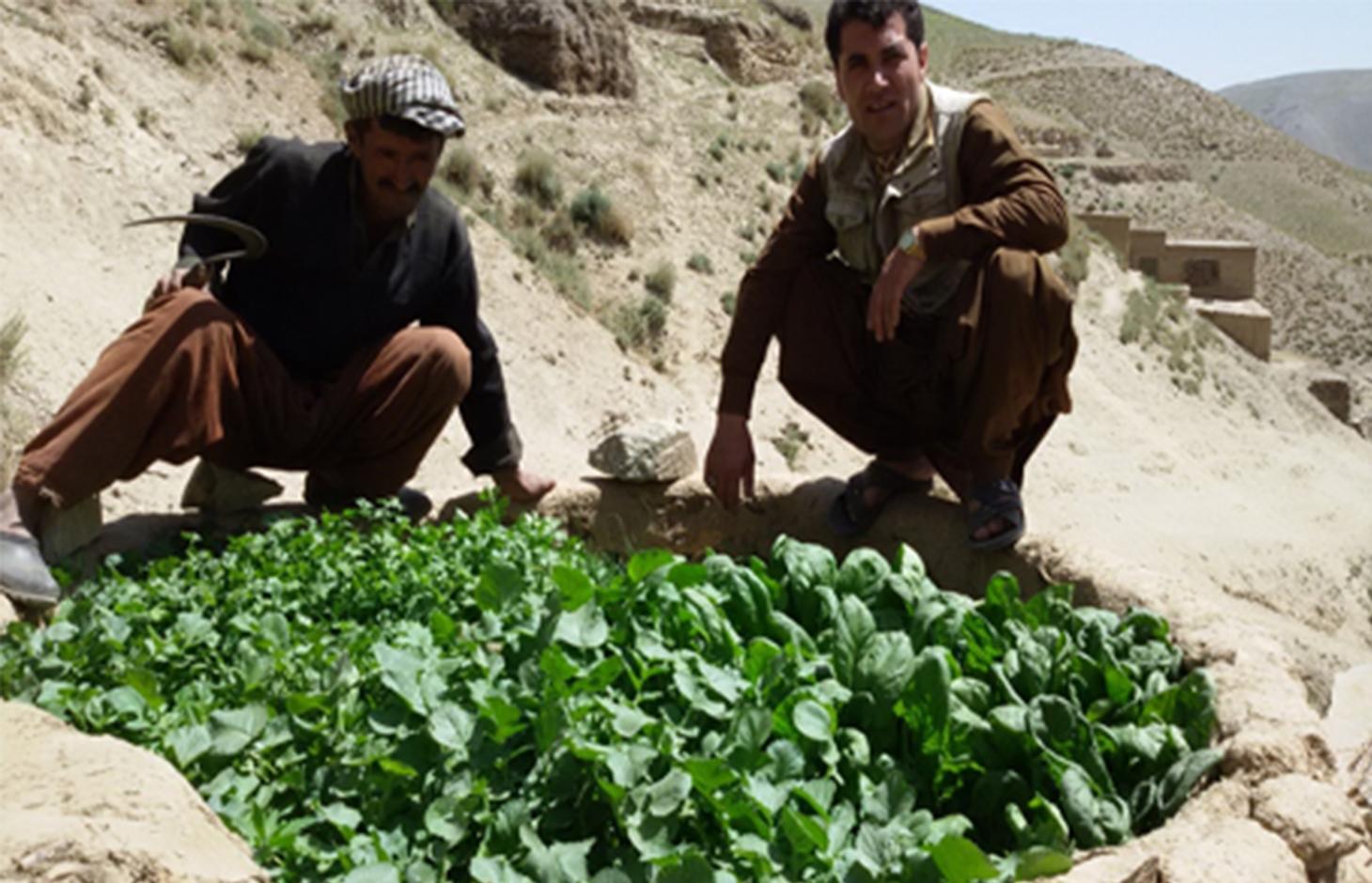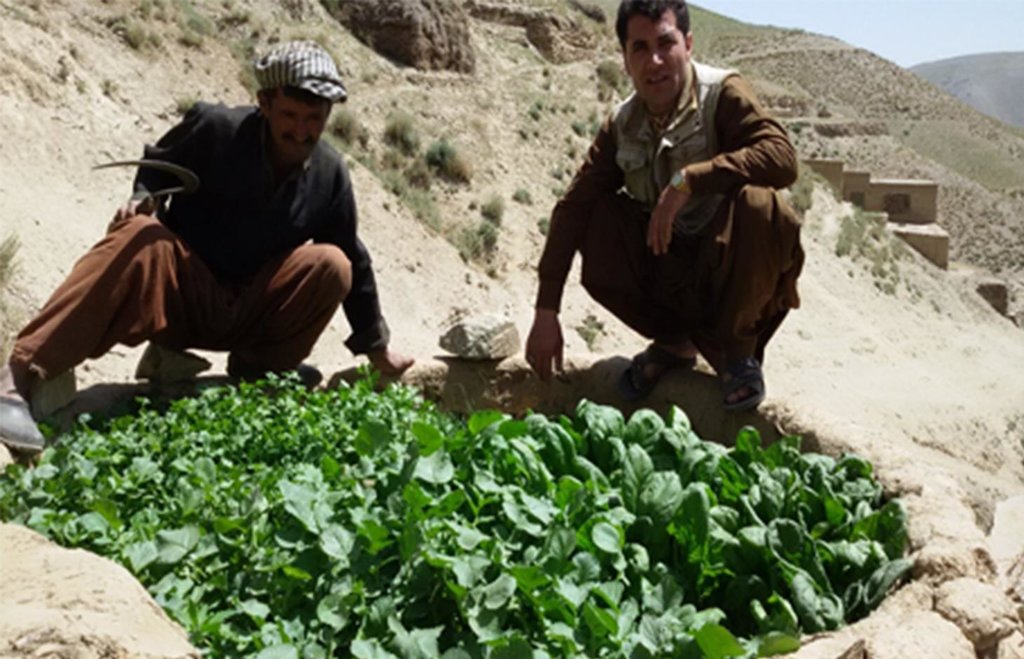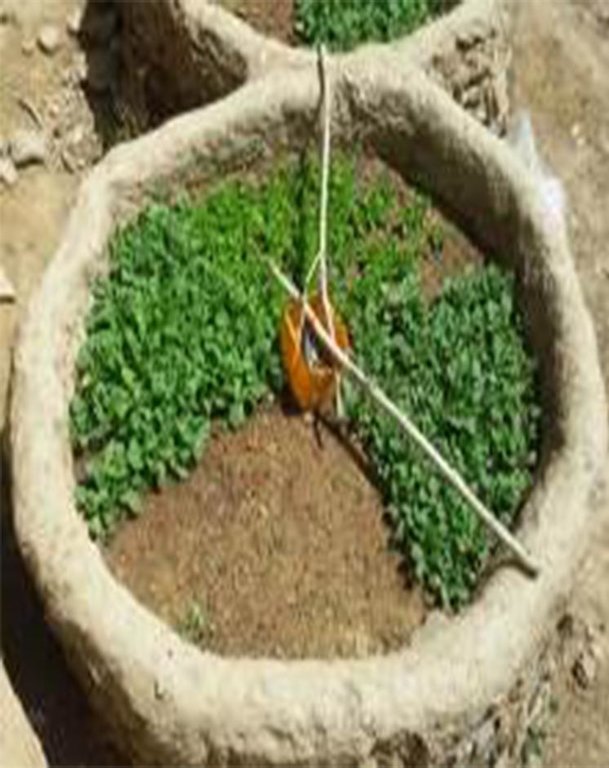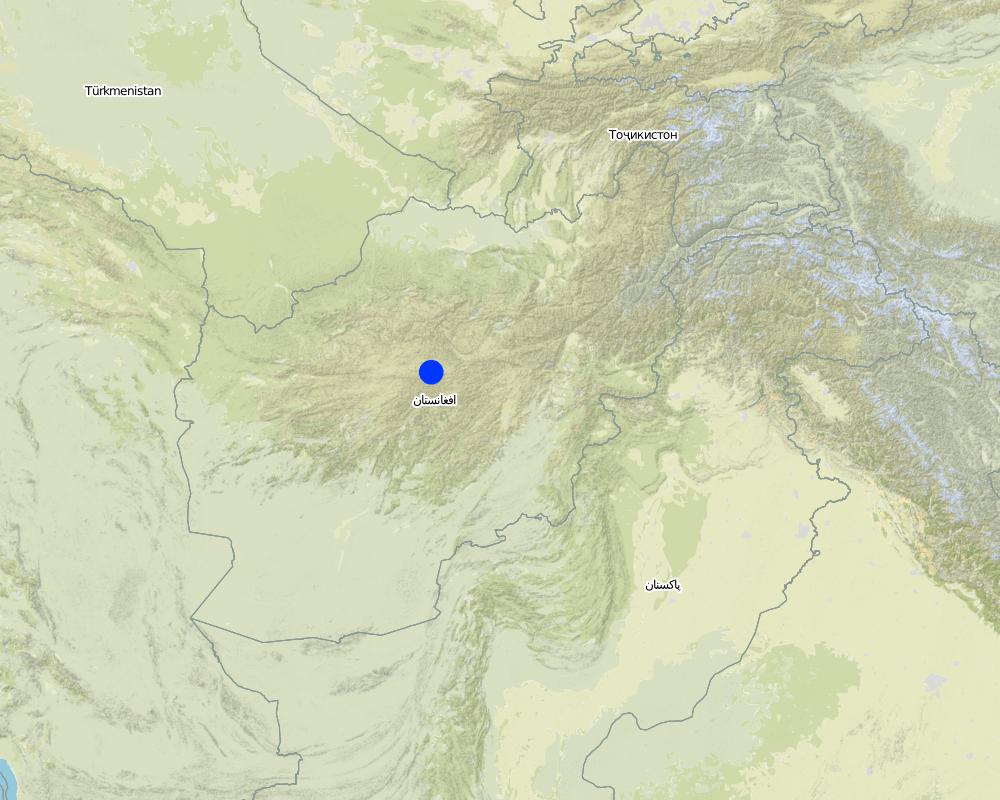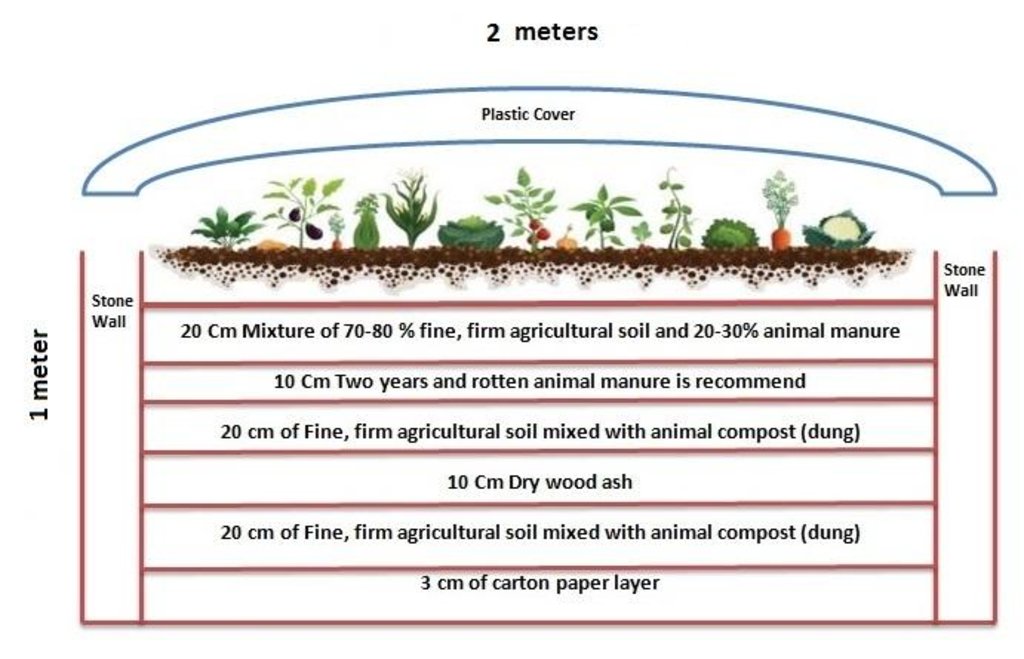Keyhole Garden [أفغانستان]
- تاريخ الإنشاء:
- تحديث:
- جامع المعلومات: Aqila Haidery
- المحرر: –
- المراجعون: David Streiff, Alexandra Gavilano
Baghche_e_Khanagi
technologies_1722 - أفغانستان
عرض الأقسام
توسيع الكل طي الكل1. معلومات عامة
1.2 تفاصيل الاتصال بالأشخاص الرئيسيين لمصدر المعلومات والمؤسسات المشاركة في تقييم وتوثيق التقنية
متخصص في الإدارة المستدامة للأراضي:
متخصص في الإدارة المستدامة للأراضي:
متخصص في الإدارة المستدامة للأراضي:
Fuleki Blanka
HELVETAS Swiss Intercooperation
اسم المؤسسة (المؤسسات) التي سهلت توثيق/تقييم التقنية (إذا كان ذلك على صلة)
HELVETAS (Swiss Intercooperation)اسم المؤسسة (المؤسسات) التي سهلت توثيق/تقييم التقنية (إذا كان ذلك على صلة)
Action Contre La Faim (ACF) - أفغانستان1.3 الشروط المتعلقة باستخدام البيانات الموثقة من خلال WOCAT
يوافق جامع المعلومات والشخص (لاشخاص) الرئيسي لمصدر المعلومات على الشروط المتعلقة باستخدام البيانات الموثقة من خلال WOCAT:
نعم
2. وصف تقنيةالإدارة المستدامي للأراضي
2.1 وصف مختصر للتقنية
تعريف التقنية:
Keyhole garden farming offers farmers the opportunity to increase production while decreasing garden area.
2.2 وصف تفصيلي للتقنية
الوصف:
The Keyhole garden technology is documented by Sustainable Land Management Project/HELVETAS Swiss Intercooperation with financial support of Swiss Agency for Development and Cooperation (SDC) and close support and cooperation of the Action Against Hunger International (ACF).
Keyhole gardens were introduced to the Laal_wa_Sarjangal community members to offer them the opportunity to produce vegetables in a small garden area. Keyhole gardens are raised beds that hold moisture and nutrients due to an active compost pile placed in the center of a round bed.
Purpose of the Technology: Keyhole gardens provide opportunities for poor, landless people to grow vegetables and improve their diets. Keyhole gardens are well-suited to places with limited arable land and to fine-textured, clayey soils which do not dry quickly. Keyhole gardens drain and warm up earlier in the spring, which allows planting of cool season vegetable on recommended planting dates. During heavy rain, water is absorbed without erosion. Thus, this technology helps the farmers access year round vegetable production.
Establishment / maintenance activities and inputs: Keyhole gardens are constructed in several steps by layering animal manure and soil, which contributes to soil fertility and drainage. A base layer, that prevents water loss, is made from plastic and carton in the bottom part of the keyhole garden. Then a central watering point is chosen that allows water to disburse into the keyhole garden layers. Leveling the surface of the keyhole garden ensures that all seeds/plants have access to the same amount of water, and helps ensure even germination.
The average size of the keyhole gardens is approximately two square meters. Construction is simple and cheap and can be easily implemented and replicated. The technology is very cost effective as local materials are used. Once they are built, keyhole gardens are easy to prepare for planting and to maintain throughout the growing season. Root crops grow longer and straighter in medium- to coarse-textured soils. Keyhole gardens are well suited to a wide range of intensive gardening techniques such as row covers, trickle irrigation, inter-cropping, successive plantings, compact varieties and mixtures of food and ornamental plantings. Keyhole gardens are usually close to home and are safe from animals, flood, avalanche and etc.
Natural / human environment: Laal_Wa_Sarjangal is one of the central districts of Ghor. It is mountainous and has a very cold dry climate (almost a five-month long winter). Livelihoods in the area are based on a mixture of rain-fed and irrigated agricultural production and animal husbandry. Market access is limited during the winter months when excessive snowfall blocks transportation routes.
2.3 صور التقنية
2.5 البلد/المنطقة/المواقع التي تم تنفيذ التقنية فيها والتي يغطيها هذا التقييم
البلد:
أفغانستان
المنطقة/الولاية/المحافظة:
Ghor province
مزيد من التفاصيل حول الموقع:
Lal Wa Sarjangal district
حدد انتشار التقنية:
- يتم تطبيقها في نقاط محددة/ تتركز على مساحة صغيرة
التعليقات:
Boundary points of the Technology area: Lal Wa Sarjangal is one of the Ghor province district has bounderies with Chaghcharan, Kohestanat, Dawlatyar, Panjab, Yakawolang and Sang-e-Takht districts
Total area covered by the SLM Technology is 2.0E-6 km2.
Each keyhole garden structure is 2 square meters and constructed for one household to cultivate vegetables for home consumption. ACF has constructed 600 keyhole gardens in total.
Map
×2.6 تاريخ التنفيذ
في حالة عدم معرفة السنة بالتحديد، يرجى الإشارة إلى التاريخ التقريبي:
- منذ أقل من 10 سنوات (مؤخرًا)
2.7 إدخال التقنية
حدد كيف تم إدخال التقنية:
- من خلال المشاريع/ التدخلات الخارجية
3. تصنيف تقنية الإدارة المستدامي للأراضي
3.1 الغرض الرئيسي ( الأغراض الرئيسية) للتقنية
- تحسين الإنتاج
3.2 نوع (أنواع) استخدام الأراضي الحالية حيث يتم تطبيق التقنية

الأراضي الزراعية
- زراعة سنوية
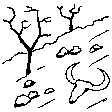
أرض غير منتجة
حدد:
Wastelands, deserts, glaciers, swamps, recreation areas, etc
التعليقات:
Major land use problems (compiler’s opinion): Lack of cultivable and fertile land, Scarcity of water, Sloppy and degraded land are the major land use problems.
Major land use problems (land users’ perception): Lack and scarcity of cultivable land.
Future (final) land use (after implementation of SLM Technology): Cropland: Ca: Annual cropping
Constraints of wastelands / deserts / glaciers / swamps: Lack of seedlings/seeds
Number of growing seasons per year: 1
Longest growing period from month to month: One season
3.3 هل تغير استخدام الأراضي نتيجة لتنفيذ التقنية؟

أرض غير منتجة
حدد:
Wastelands, deserts, glaciers, swamps, recreation areas, etc
3.5 مجموعةالإدارة المستدامة للأراضي التي تنتمي إليها هذه التقنية
- حدائق منزلية
3.6 التدابير التقنية في مجال إلادارة المستدامة للأراضي
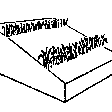
التدابير النباتية
- V5: أخرى
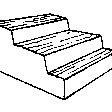
التدابير البنيوية
- S11: غير ذلك
التعليقات:
Specification of other vegetative measures: Planatation of vegetables for household consumption
Specification of other structural measures: keyhole garden
3.7 الأنواع الرئيسية من تدهور الأراضي التي تناولتها التقنية

تآكل التربة بالمياه
- الوزن(Wt): فقدان التربة السطحية/تآكل السطح
- (Wm): مجموعة كبيرة من الحركات الأرضية/انزلاقات أرضية
التعليقات:
Main causes of degradation: over-exploitation of vegetation for domestic use, population pressure
3.8 منع أو حد أو عكس تدهور الأراضي
تحديد هدف التقنية فيما يتعلق بتدهور الأراضي:
- اصلاح/إعادة تأهيل الأراضي المتدهورة بشدة
4. المواصفات الفنية، وأنشطة التنفيذ، والمدخلات، والتكاليف
4.1 الرسم الفني للتقنية
المواصفات الفنية (المتعلقة بالرسم الفني):
A detailed technical drawing of a keyhole garden (length: 2 m, height: 1 m) constructed by the technical support of Action Against Hunger International (ACF).
Technical knowledge required for field staff / advisors: low
Main technical functions: reduction of slope length, improvement of ground cover, water harvesting / increase water supply, increase vegetation
Secondary technical functions: improvement of topsoil structure (compaction), stabilisation of soil (eg by tree roots against land slides)
Vegetative measure: scattered / dispersed in Keyhole
Vegetative material: O : other
Vegetative measure: Vegetative material: O : other
Other species: Various vegetables
المؤلف:
Ezatullah Noori, Action Against Hunger International
4.2 معلومات عامة بخصوص حساب المدخلات والتكاليف
حدد كيفية احتساب التكاليف والمدخلات:
- لكل وحدة تقنية
حدد الوحدة:
Keyhole garden
حدد أبعاد الوحدة (إذا كانت ذات صلة):
length: 2 m, height: 1 m
حدد العملة المستخدمة لحساب التكاليف:
- دولار أمريكي USD
اذكر متوسط تكلفة أجر العمالة المستأجرة في اليوم الواحد:
6.00
4.3 أنشطة التأسيس
| النشاط | التوقيت (الموسم) | |
|---|---|---|
| 1. | Construction of the Keyhole garden with local available materials (plastic sheet, rope and water-cane) | |
| 2. | Plantation in the keyhole garden under ACF's supervision |
4.4 التكاليف والمدخلات اللازمة للتأسيس
| تحديد المدخلات | الوحدة | الكمية | التكاليف لكل وحدة | إجمالي التكاليف لكل مدخل | % من التكاليف التي يتحملها مستخدمو الأراضي | |
|---|---|---|---|---|---|---|
| العمالة | Construction of the Keyhole garden (seeds) | persons/day/unit | 1,0 | 6,0 | 6,0 | 30,0 |
| العمالة | Plantation in the keyhole garden | unit | 1,0 | 2,0 | 2,0 | 20,0 |
| معدات | Water-cane | pieces | 1,0 | 2,0 | 2,0 | 30,0 |
| مواد البناء | Plastic sheet | meter | 2,0 | 1,25 | 2,5 | 30,0 |
| مواد البناء | Rope | meter | 2,0 | 0,75 | 1,5 | 30,0 |
| إجمالي تكاليف إنشاء التقنية | 14,0 | |||||
| إجمالي تكاليف إنشاء التقنية بالدولار الأمريكي | 14,0 | |||||
4.5 الصيانة/الأنشطة المتكررة
| النشاط | التوقيت/الوتيرة | |
|---|---|---|
| 1. | Plantation in the keyhole garden |
4.6 التكاليف والمدخلات اللازمة للصيانة/للأنشطة المتكررة (سنويًا)
| تحديد المدخلات | الوحدة | الكمية | التكاليف لكل وحدة | إجمالي التكاليف لكل مدخل | % من التكاليف التي يتحملها مستخدمو الأراضي | |
|---|---|---|---|---|---|---|
| العمالة | Plantation in the keyhole garden (seeds) | unit | 1,0 | 2,0 | 2,0 | 40,0 |
| إجمالي تكاليف صيانة التقنية | 2,0 | |||||
| إجمالي تكاليف صيانة التقنية بالدولار الأمريكي | 2,0 | |||||
4.7 أهم العوامل المؤثرة على التكاليف
قدم وصفا لأهم العوامل التي تؤثر على التكاليف:
The technology is low cost and can be accomplished by using local available materials
5. البيئة الطبيعية والبشرية
5.1 المناخ
هطول الأمطار السنوي
- < 250 مم
- 251- 500 ملم
- 501 - 750ملم
- 1,000-751 ملم
- 1,500-1,100 ملم
- 2,000-1,500 ملم
- 3,000-2,001 ملم
- 4,000-3,100 ملم
- > 4000 ملم
المنطقة المناخية الزراعية
- شبه قاحلة
Thermal climate class: temperate
With long winter season
5.2 طوبوغرافيا
متوسط الانحدارات:
- مسطح (0-2%)
- بسيط (3-5%)
- معتدل (6-10%)
- متدحرج (11-15%)
- تلال (16-30%)
- شديدة الانحدار(31-60%)
- فائقة الانحدار (>60%)
التضاريس:
- هضاب/سهول
- أثلام مرتفعة
- المنحدرات الجبلية
- منحدرات التلال
- منحدرات في السفوح
- قاع الوادي
المنطقة الارتفاعية:
- 100-0 متر فوق سطح البحر
- 500-101 متر فوق سطح البحر
- 1,000-501 متر فوق سطح البحر
- 1,500-1,001 متر فوق سطح البحر
- 2,000-1,501 متر فوق سطح البحر
- 2,500-2,100 متر فوق سطح البحر
- 3,000-2,501 متر فوق سطح البحر
- 4,000-3,001 متر فوق سطح البحر
- > 4000 متر فوق سطح البحر
5.3 التربة
متوسط عمق التربة:
- ضحل جدًا (0-20 سم)
- ضحلة (21-50 سم)
- متوسطة العمق (51-80 سم)
- عميقة (81-120 سم)
- عميقة جدًا (> 120 سم)
قوام التربة (التربة السطحية):
- خشن / خفيف (رملي)
المواد العضوية في التربة السطحية:
- منخفضة (<1%)
إذا كان متاحًا، قم بإرفاق وصف كامل للتربة أو تحديد المعلومات المتوفرة، على سبيل المثال نوع التربة، الرقم الهيدروجيني/ درجة حموضة التربة، قدرة التبادل الكاتيوني، النيتروجين، الملوحة وما إلى ذلك.
Soil fertility is low
Soil drainage / infiltration is poor
Soil water storage capacity is medium
5.4 توافر المياه ونوعيتها
منسوب المياه الجوفية:
50-5 م
توافر المياه السطحية:
متوسط
نوعية المياه (غير المعالجة):
مياه شرب جيدة
5.5 التنوع البيولوجي
تنوع الأنواع:
- منخفض
5.6 خصائص مستخدمي الأراضي الذين يطبقون التقنية
الدخل من خارج المزرعة:
- 10-50% من جميع الإيرادات
المستوى النسبي للثروة:
- ضعيف
أفراداً أو مجموعات:
- فرد/أسرة معيشية
الجنس:
- نساء
- رجال
اذكر الخصائص الأخرى ذات الصلة لمستخدمي الأراضي:
Land users applying the Technology are mainly disadvantaged land users
Population density: 10-50 persons/km2
Annual population growth: 2% - 3%
5.7 متوسط مساحة الأرض التي يستخدمها مستخدمو الأراضي الذين يطبقون التقنية
- < 0.5 هكتارا
- 0.5 - 1 هكتار
- 1 -2 هكتار
- 2 - 5 هكتار
- 5 - 15 هكتار
- 15 - 50 هكتار
- 50 - 100هكتار
- 500-100 هكتار
- 1,000-500 هكتار
- 10,000-1,000 هكتار
- > 10,000 هكتار
هل يعتبر هذا نطاقًا صغيرًا أو متوسطًا أو واسعا (في إشارة إلى السياق المحلي)؟:
- على نطاق صغير
5.8 ملكية الأراضي، وحقوق استخدام الأراضي، وحقوق استخدام المياه
- individual
حقوق استخدام الأراضي:
- مجتمعي (منظم)
حقوق استخدام المياه:
- مجتمعي (منظم)
التعليقات:
means subject to community-agreed management rules.
5.9 الوصول إلى الخدمات والبنية التحتية
الصحة:
- ضعيف
- معتدل
- جيد
التعليم:
- ضعيف
- معتدل
- جيد
المساعدة التقنية:
- ضعيف
- معتدل
- جيد
العمل (على سبيل المثال خارج المزرعة):
- ضعيف
- معتدل
- جيد
الأسواق:
- ضعيف
- معتدل
- جيد
الطاقة:
- ضعيف
- معتدل
- جيد
الطرق والنقل:
- ضعيف
- معتدل
- جيد
مياه الشرب وخدمات الصرف الصحي:
- ضعيف
- معتدل
- جيد
الخدمات المالية:
- ضعيف
- معتدل
- جيد
6. الآثار والتصريحات الختامية
6.1 الآثار التي أظهرتها التقنية في الموقع
الآثار الاجتماعية والاقتصادية
الإنتاج
منطقة الإنتاج
الآثار الاجتماعية والثقافية
الأمن الغذائي / الاكتفاء الذاتي
livelihood and human well-being
التعليقات/ حدد:
Vegetable cultivation in this area is newly introduced and has improved the health of the families. Even they can have access to vegetables in a colder season as well
dependence on external support
الآثار الايكولوجية
دورة المياه / الجريان السطحي
الجريان السطحي
التربة
غطاء التربة
فقدان التربة
دورة المغذيات/إعادة الشحن
التنوع البيولوجي: الغطاء النباتي، الحيوانات
الغطاء النباتي
6.2 الآثار التي أظهرتها التقنية خارج الموقع
soil, vegetation and wastelands quality
buffering/filtering
6.3 تعرض التقنية وحساسيتها لتغير المناخ التدريجي والظواهر المتطرفة/الكوارث المرتبطة بالمناخ (كما يراها مستخدمو الأراضي)
تغير مناخ تدريجي
تغير مناخ تدريجي
| الموسم | زيادة أو نقصان | كيف تتعامل التقنية مع ذلك؟ | |
|---|---|---|---|
| درجة الحرارة السنوية | زيادة | جيدا |
الظواهر المتطرفة / الكوارث المرتبطة بالمناخ
الكوارث الجوية
| كيف تتعامل التقنية مع ذلك؟ | |
|---|---|
| عاصفة ممطرة محلية | ليس جيدا |
| عاصفة هوائية محلية | جيدا |
الكوارث الهيدرولوجية
| كيف تتعامل التقنية مع ذلك؟ | |
|---|---|
| فيضان عام (نهر) | ليس جيدا |
التعليقات:
Construction of the technology in the protected and safe areas.
6.4 تحليل التكلفة والعائد
كيف يمكن مقارنة العوائد نسبة لتكاليف الإنشاء (من وجهة نظر مستخدمي الأراضي)؟
عوائد قصيرة الأجل:
إيجابي
عوائد طويلة الأجل:
ايجابي جدا
كيف تتم مقارنة العوائدمع كلفة الصيانة/التكاليف المتكررة (من وجهة نظر مستخدمي الأراضي)؟
عوائد قصيرة الأجل:
إيجابي
عوائد طويلة الأجل:
ايجابي جدا
6.5 اعتماد التقنية
- حالات فردية/تجريبية
من بين جميع الذين تبنوا التقنية، كم عدد الذين فعلوا ذلك بشكل تلقائي، أي دون تلقي أي حوافز مادية/مدفوعات؟:
- 10-0%
التعليقات:
1 land user families have adopted the Technology with external material support
Comments on spontaneous adoption: Many other land user families have implemented the technology with out any external material support, unfortunately information regarding the exact number of the families is not available.
There is a strong trend towards spontaneous adoption of the Technology
Comments on adoption trend: The technology, provided vegetables to the community all year round and even in an extremely cold weather.
6.7 نقاط القوة / المزايا / الفرص التي توفرها التقنية
| نقاط القوة/ المزايا/ الفرص من وجهة نظر مستخدمي الأراضي |
|---|
| Productive, can get high yields from a relatively small surface area, can extend the cultivation time if protected from frost and covered by plastic. |
| نقاط القوة/ المزايا/ الفرص من وجهة نظر جامع المعلومات أو غيره من الاشخاص الرئيسيين لمصدر المعلومات |
|---|
|
Low cost, easy to replicate, requires little labor at the stage of establishment and can be done by beneficiary and requires little maintenance. How can they be sustained / enhanced? People can use local available materials |
|
Locally adaptable, doesn’t require productive land, the soil for cultivation could be easily prepared and managed, doesn’t require chemical fertilizers. How can they be sustained / enhanced? Technical support and training can be provided for the community members to change the land in to a productive land with out using any chemical fertilizer. |
|
Can be managed by females in the household, less chance for vegetables contamination. How can they be sustained / enhanced? Women should be encouraged and given technical assistance. |
|
Requires little water for irrigation. How can they be sustained / enhanced? The keyhole garden could be irrigated by kitchen waste water. |
6.8 نقاط ضعف / مساوىء / مخاطر التقنية وسبل التغلب عليها
| نقاط الضعف/ المساوىء/ المخاطر من وجهة نظر جامع المعلومات أو غيره من الاشخاص الرئيسيين لمصدر المعلومات | كيف يمكن التغلب عليها؟ |
|---|---|
| Unavailability of seed | Can be solved through resourcing good quality seed from seed preservation. Start farming under plastic early in the spring to have enough time for seeds preservation. |
7. المراجع والروابط
7.1 طرق جمع/مصادر المعلومات
الروابط والوحدات المواضيعية
توسيع الكل طي الكلالروابط
لا يوجد روابط
الوحدات المواضيعية
لا يوجد وحدات مواضيعية


